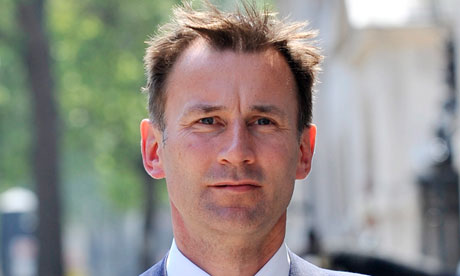Culture secretary told David Cameron the 'media sector would suffer for years' if News Corp's bid for BSkyB was blocked
Jeremy Hunt, the culture secretary, urged the prime minister to back News Corp's takeover bid for BSkyB. Photograph: Andy Rain/EPA
The culture secretary, Jeremy Hunt, wrote privately to the prime minister urging him in strong terms to back Rupert Murdoch's takeover bid for BSkyB just a month before David Cameron appointed him to take charge of the bid himself in a "quasi-judicial" capacity.
The intervention by Hunt, who is facing calls for his resignation, was revealed for the first time in a document shown to the Leveson inquiry on Thursday. Hunt urged Cameron not to allow the business secretary, Vince Cable, to block the BSkyB bid despite strong advice to the culture secretary from his own officials that he should not involve himself in the process.
The culture secretary claimed to the prime minister that if the Murdoch bid was blocked "our media sector will suffer for years". He asked for a meeting with Cable and Cameron to discuss the handling of the deal.
The document appears to corroborate the picture that emerges from earlier email exchanges between Hunt's aide Adam Smith and the News Corp lobbyist Frédéric Michel. Those emails document an apparently collusive relationship with the Murdoch empire and have already put Hunt's cabinet position in peril.
Hunt drafted his memo to Cameron on 19 November 2010, initially using his and his aide's private Gmail accounts instead of the government email system, according to counsel to the inquiry. Hunt protested in strong terms about Cable's decision to move against the bid earlier that month by calling in the regulator, Ofcom, to investigate.
Warning that "James Murdoch is pretty furious", Hunt went on to demand "Why are we trying to stop it? … I think it would be totally wrong to cave in to the Mark Thompson/Channel 4/Guardian line".
The BBC director general, Mark Thompson, and other media firms were opposing the bid, saying it would make the Murdoch empire too powerful.
Hunt, who by then had already been extensively lobbied by News Corp and received angry phone calls from Rupert Murdoch's son James, said: "I am concerned because essentially what James Murdoch wants to do is to repeat what his father did with the move to Wapping … The UK has the chance to lead the way on this as we did in 80s with the Wapping move."
In evoking the spirit of Wapping, Hunt was reminding David Cameron of the way Rupert Murdoch was allowed to buy the Times and the Sunday Times after vociferously supporting the Conservatives in his tabloids and holding a secret meeting with Margaret Thatcher at Chequers. Murdoch then famously broke the power of the print unions by moving his operations to Wapping, where police helped staff brave picket-lines.
The phrasing of Hunt's 19 November draft memo appears to have been sanitised before being sent to No 10, with the help of Smith. The inquiry was told there was also in existence an earlier version of Hunt's thinking. The final version said: "It would [be] totally wrong for the government to get involved in a competition issue which has to be decided at arms length."
Hunt's activities on Murdoch's behalf had been the subject of stern legal warnings from his own department, according to the inquiry's counsel, Robert Jay. He said the Department for Culture, Media and Sport's legal director had advised that although it was not directly illegal for him to attempt to intervene, to do so would be "unwise". One arrangement to meet James Murdoch had to be cancelled, but Hunt instead spoke to him privately on the phone. Michel, James Murdoch's lobbyist, told his boss in one of the previously disclosed emails: "Jeremy … has received very strong legal advice not to meet us today as the current process is treated as a judicial one (not a policy one) and any meeting could be referred to and jeopardise the entire process. Jeremy is very frustrated about it but the permanent secretary has now also been involved … You could have a chat with him on his mobile … and I will liaise with his team privately as well."
Four days after receiving this warning, it now appears that Hunt drafted his plea to the prime minister to step in. It is not known what Cameron did as an immediate result. Shortly afterwards, the Conservative-supporting Telegraph newspaper embarked on an elaborate "sting" operation against Vince Cable. On 3 December, two reporters pretended to be his constituents and by what seems to have been an extraordinary coincidence, he confided in them that he had "declared war" against Murdoch.
This was greeted with outrage both by the Murdoch camp and by the prime minister, who declared it was "unacceptable" for Cable to have such bias. Cameron promptly turned the decision over to Hunt. The disclosed documents appear to reveal that Cameron knew perfectly well at the time that Hunt, too, was biased – but biased the other way.
The cabinet secretary, Gus O'Donnell, stated publicly, however, that he himself had taken legal advice and had decided that, although Hunt had made previous public statements sympathetic to the bid: "I am satisfied that those statements do not amount to a pre-judgment of the case."
Hunt's former aide, Adam Smith, was initially reluctant to concede that the culture secretary had backed the Murdoch bid from the outset. Under persistent questioning from Jay, he eventually admitted, however, that Hunt's "personal view" was in fact favourable to the bid.

